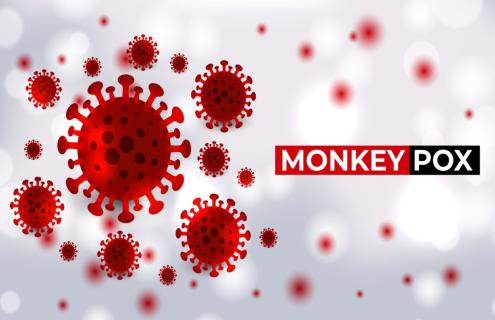
Prioritizing isolation and source control strategies helps prevent transmission while balancing the impact of this infection on the daily lives of people diagnosed with monkeypox.
Jessica L. Swain, MBA, MLT, CIC, director of Infection Prevention and Control, Dartmouth HealthOn Thursday, August 4, the Biden administration declared the growing monkeypox outbreak in the United States a national health emergency. Monkeypox is an infectious viral disease that causes skin lesions, often preceded or followed by influenza-like symptoms, with possible complications including significant scarring, secondary infections, pneumonia, sepsis, encephalitis, and loss of vision with severe eye infection. The current outbreak began in May and the disease was first detected in New Hampshire in late June.
To address concerns from the public about monkeypox, Dartmouth Health has established a hotline to answer general questions about the disease. The hotline number is 603-650-1818 and it is operational Monday-Friday from 7 am-5 pm, and Saturday from 8 am-12 pm. The hotline is closed on Sundays.
If you believe you have come into contact with or contracted monkeypox, you may call the Dartmouth Health hotline for information, and you should isolate at home and contact your primary care provider to determine next steps with respect to your care. Visiting an emergency department immediately is not recommended.
“The Centers for Disease Control and Prevention recommends that people with monkeypox remain isolated at home or at another location for the duration of illness, but that might not be possible in all situations,” said Jessica L. Swain, MBA, MLT, CIC, director of Infection Prevention and Control at Dartmouth Health. “Prioritizing isolation and source control strategies helps prevent transmission while balancing the impact of this infection on the daily lives of people diagnosed with monkeypox.”
Monkeypox is spread through close contact that may include sexual/intimate activity; direct contact with monkeypox rash, scabs, or body fluids from a person with monkeypox; scratches/bites from an infected animal, or preparing or eating meat or using products from an infected animal; touching objects, fabrics (clothing, bedding, or towels), and surfaces that have been used by someone with monkeypox; or contact with respiratory secretions such as saliva from someone with monkeypox coming in contact with someone’s eye or mouth. Being in a room with someone with monkeypox without the above exposures is low risk for transmission, especially if fotr less than three hours and/or greater than six feet away. Symptoms may include:
- Fever
- Headache
- Muscle aches and backache
- Swollen lymph nodes
- Chills
- Exhaustion
- Respiratory symptoms (e.g. sore throat, nasal congestion, or cough)
- A rash that may be located on or near the genitals or anus, but could also be on other areas like the hands, feet, chest, face, or mouth
- The rash will go through several stages, including scabs, before healing.
- The rash can look like pimples or blisters and may be painful or itchy.
Infections with the type of monkeypox identified in the current outbreak are rarely fatal, but can be more dangerous for people with immunodeficiency and/or comorbidities. The risk level for children and pregnant people is unknown, and monkeypox may be passed from a pregnant person to a fetus.
For more information on monkeypox, visit:
- CDC: https://www.cdc.gov/monkeypox/index.html
- New Hampshire Department of Health and Human Services: https://www.dhhs.nh.gov/programs-services/disease-prevention/infectious-disease-control/monkeypox
- Vermont Department of Health: https://www.healthvermont.gov/disease-control/zoonotic-diseases/human-monkeypox-virus-hmpxv
- Massachusetts Department of Public Health: https://www.mass.gov/monkeypox
About Dartmouth Health
Dartmouth Health, New Hampshire’s only academic health system and the state’s largest private employer, serves patients across northern New England. Dartmouth Health provides access to more than 2,000 providers in almost every area of medicine, delivering care at its flagship hospital, Dartmouth Hitchcock Medical Center (DHMC) in Lebanon, NH, as well as across its wide network of hospitals, clinics and care facilities. DHMC is consistently named the #1 hospital in New Hampshire by U.S. News & World Report, and is recognized for high performance in numerous clinical specialties and procedures. Dartmouth Health includes Dartmouth Cancer Center, one of only 57 National Cancer Institute-designated Comprehensive Cancer Centers in the nation, and the only such center in northern New England; Dartmouth Health Children’s, which includes the state’s only children’s hospital and multiple locations around the region; member hospitals in Lebanon, Keene, Claremont and New London, NH, and Windsor and Bennington, VT; Visiting Nurse and Hospice for Vermont and New Hampshire; and more than 24 clinics that provide ambulatory and specialty services across New Hampshire and Vermont. Through its historical partnership with Dartmouth and the Geisel School of Medicine, Dartmouth Health trains nearly 400 medical residents and fellows annually, and performs cutting-edge research and clinical trials recognized across the globe with Geisel and the White River Junction VA Medical Center in White River Junction, VT. Dartmouth Health and its more than 13,000 employees are deeply committed to serving the healthcare needs of everyone in our communities, and to providing each of our patients with exceptional, personal care.